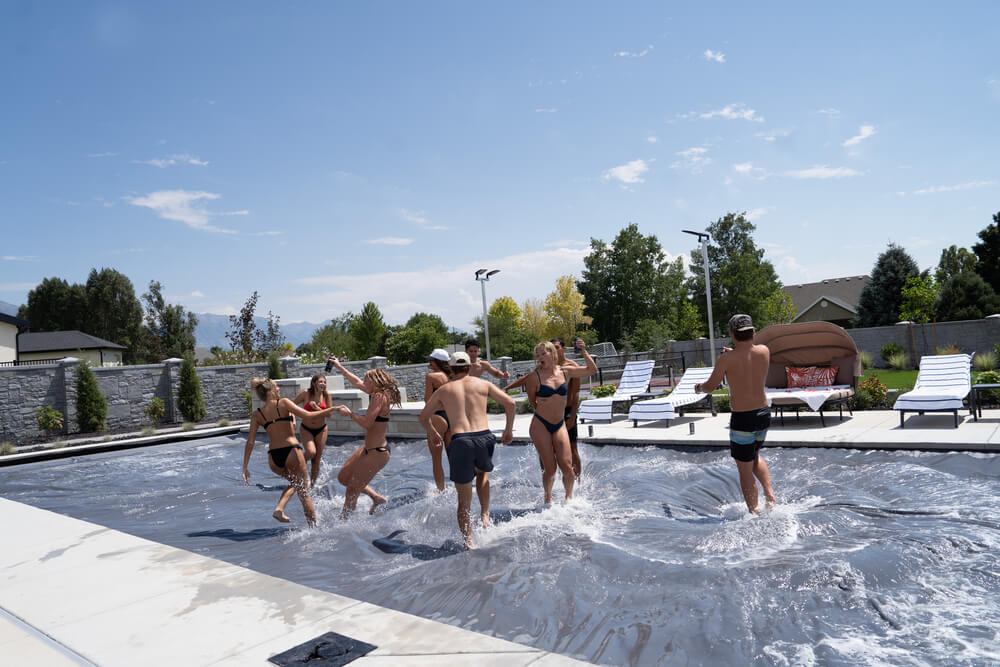The allure of owning a private swimming pool is undeniable, offering an oasis of relaxation and recreation right at your doorstep. However, this coveted luxury comes with its fair share of considerations. In this blog, we delve into the captivating world of pool ownership, exploring the enticing benefits as well as the practical challenges. Join us as we navigate the refreshing waters of the pros and cons, helping you make an informed decision about whether taking the plunge into pool ownership aligns with your lifestyle and aspirations.
Pros of Owning Your Own Pool
Owning a personal swimming pool comes with a range of benefits that cater to convenience, health, privacy, and property enhancement. Here are some key advantages:
Convenience and Accessibility:
-
Immediate Access: Enjoy swimming and relaxation right at home, without the need to travel.
-
Freedom from Public Pool Schedules: No more adhering to limited public pool hours or contending with overcrowding.
-
Physical Fitness and Family Bonding: Your pool becomes a convenient spot for regular exercise and a space for quality family time.
Privacy and Personalization:
-
Exclusive Swims: Experience the luxury of swimming without the presence of unfamiliar individuals.
-
Customization: Tailor the pool area to match your preferences, creating a unique and inviting space.
-
Host Gatherings: Organize pool parties and gatherings with friends and family in a controlled and comfortable environment.
Health and Wellness:
-
Regular Exercise: Engage in low-impact workouts and cardiovascular activities without leaving your property.
-
Therapeutic Benefits: Water-based activities offer stress relief and aid in muscle recovery.
-
Overall Well-being: Consistent pool use can contribute to improved physical health and an enhanced sense of well-being.
Property Value and Aesthetics:
-
Increased Property Value: A well-maintained pool can boost the overall value of your property.
-
Enhanced Outdoor Appeal: The addition of a pool complements your outdoor space, adding to the overall curb appeal.
-
Relaxing Oasis: Create a serene and calming environment that aligns with your lifestyle and provides a retreat from daily pressures.
Cons of Owning Your Own Pool
While the allure of a private pool is undeniable, there are several important considerations that warrant attention:
High Initial and Ongoing Costs:
The dream of pool ownership comes with financial implications that extend beyond the initial investment:
-
Installation Expenses: The upfront costs are substantial, encompassing installation, permits, landscaping, and equipment.
-
Recurring Financial Commitment: Continuous expenditures for maintenance, chemicals, cleaning, and potential repairs are part of the package.
-
Financial Impact: Owning a pool can strain your overall budget and create financial obligations that need careful management.
Maintenance and Time Commitment:
Maintaining a pool demands consistent effort and time investment:
-
Routine Upkeep: Regular cleaning, filtration, and chemical balancing are essential to preserve water quality.
-
Seasonal Demands: Opening and closing the pool for different seasons adds to the workload.
-
Time and Energy: The dedication required might clash with a hectic schedule, leading to potential stress.
Safety Concerns and Liability:
Safety considerations are paramount for pool owners, particularly those with families:
-
Family Safety: Families with young children face inherent risks, necessitating vigilant supervision.
-
Safety Measures: Installing safety features like fences, covers, and alarms is vital to mitigate potential accidents.
-
Liability Risks: The responsibility that comes with pool ownership includes the potential for legal repercussions if accidents occur on your property.
Environmental Impact:
Owning a pool has broader ecological consequences that shouldn’t be ignored:
-
Water Consumption: Pools are water-intensive and can strain local resources, especially during droughts.
-
Chemical Effects: Improper chemical management can lead to environmental harm, affecting soil and water quality.
-
Ethical Considerations: Operating a pool during water scarcity periods raises ethical concerns about responsible resource use.
Understanding and weighing these cons alongside the benefits is essential to making a well-informed decision about whether owning a pool aligns with your lifestyle, financial capacity, and environmental mindfulness.
Making an Informed Decision
Contemplating whether to invest in a personal pool warrants careful thought and consideration. Here’s a guide to aid you in arriving at a well-informed choice:
Assessing your Lifestyle and Priorities:
Before diving into pool ownership, evaluate your lifestyle and priorities:
-
Frequency of Use: Consider how often you envision using the pool. Assess whether it aligns with your routine and how much value it would add to your lifestyle.
-
Financial Feasibility: Weigh the financial impact of installation, maintenance, and associated costs. Determine if it fits within your budget and future financial plans.
-
Time Investment: Reflect on your willingness to invest time and effort into pool maintenance. Assess whether you’re prepared for the regular upkeep it requires.
-
Space Suitability: Examine the available space in your property and its compatibility for a pool. Consider factors like size, placement, and how it will harmonize with your outdoor area.
Exploring Alternatives:
Before committing to pool ownership, explore alternative options to fulfill your aquatic desires:
-
Community Pools: Research local community pools or swim clubs as more cost-effective alternatives. This allows you to enjoy swimming without the maintenance responsibilities.
-
Gym and Club Memberships: Consider gyms or clubs that offer swimming facilities. This option grants access to a pool while also providing access to other amenities.
-
Leisure Activities Comparison: Compare the benefits of pool ownership against other leisure activities you enjoy. Evaluate how a pool fits into your overall recreation priorities.
Ultimately, the decision to own a pool requires a balance between your preferences, budget, and practical considerations. By thoroughly assessing your lifestyle, exploring alternatives, and weighing the pros and cons, you can make an informed choice that aligns with your aspirations and responsibilities.
Conclusion
In the journey to decide whether owning a personal pool is the right choice for you, it’s crucial to take into account both the appealing advantages and potential challenges. As we wrap up our exploration of the pros and cons, let’s reflect on the key points and underscore the significance of a well-considered decision-making process.
Recap of Pros and Cons:
We’ve examined the numerous benefits that owning a pool can bring to your life, from the convenience of immediate access to the privacy and personalization it offers. Moreover, the health and wellness advantages, including therapeutic benefits and property value enhancement, cannot be overlooked. On the flip side, we’ve also highlighted the high initial and ongoing costs, maintenance demands, safety concerns, and environmental impacts that come with pool ownership.
Informed Decision-Making:
Making a choice about pool ownership should be driven by a thorough understanding of your unique circumstances. No two situations are the same, and what might be a perfect fit for one person might not be ideal for another. It’s essential to consider your lifestyle, budget, time availability, and priorities before taking the plunge into pool ownership.
Careful Evaluation and Consideration:
We encourage you to take the time to evaluate your needs and preferences thoughtfully. Consider how frequently you’ll use the pool, your financial capacity to manage both initial expenses and ongoing costs, and your willingness to dedicate time to maintenance. Assessing your available space and considering alternative options, such as community pools or gym memberships, can provide valuable insights.
In Summation:
As you stand at the crossroads of this decision, remember that a well-informed choice is the most empowering one. By weighing the advantages and disadvantages against your own circumstances, you can make a decision that aligns with your goals, lifestyle, and values. Whether you’re seeking a family gathering space, a fitness outlet, or a serene retreat, careful evaluation will guide you toward a decision that best suits your aspirations and fulfills your needs.


